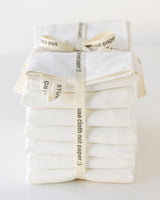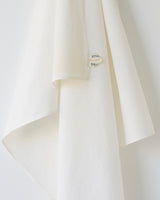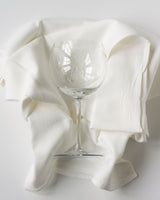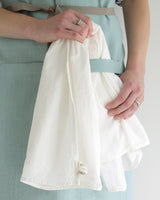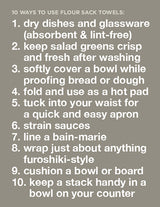Flour Sack Towels - Set of 7
Stock up with this stack of 7 Flour Sack Towels, and always keep them handy for all kitchen and household tasks. When we went looking for the best quality flour sack towels, we found these: the modern-day upgrade to the old-world tradition of flour sack weave. Our cooking customers rely on them to wipe, dry, clean, polish, cushion, protect and wrap — without lint, scratches or streaks. Pre-washed, extra-thick and absorbent, these towels have endless utility. Sustainable and practical too, so replace those paper towels and use cloth, not paper :)
- 100% durable cotton, washed twice + lightly ironed
- Nice and big at 27" x 27"
- Smooth and super-absorbent
- Lint-free!
- Ships as a stack of 7 towels, ready for gifting
- Wrapped + tied with a twill “use cloth not paper” ribbon

- Linen is wonderful and luxurious. It’s one of the easiest fabrics to care for.
- The smooth and long fibers of linen help resist dirt and stains.
- It gets better with age and softens the more it is washed.
- Linen absorbs water quickly and dries quickly.
- It is durable and strong, lint-free and resistant to pilling.
- Linen can withstand high temperatures.
- It is inherently eco-friendly. Flax has a short growing cycle, is quickly renewable, and every part of the plant is used.
Tea Towels
- Machine wash in cool to warm water.
- Use a mild detergent, no bleach.
- Line dry or tumble dry on low heat; remove while still damp.
- Ironing is optional. Some people prefer linen crisp and flat, others like it soft and natural.
- Dry thoroughly before storing.
- We encourage you to use your tea towels daily and enjoy the patina that comes with age!
- Machine wash in cool to warm water.
- Use a mild detergent, no bleach.
- Hang to dry, or tumble dry on low heat and remove while slightly damp. There is very little to no shrinkage when washed this way.
- For natural or colored linen, it’s best not to hang in bright sunlight to avoid fading.
- Ironing is optional, and much easier to do while your apron is still damp. Use a hot iron with plenty of steam or a spray of water.
- Store in a dry, well-ventilated area. Well-cared for linen aprons will last for generations.
Stains
- Remove stains with soap and water while still fresh, before they dry.
- Pre-soaking in mild detergent is very effective in lifting stains.
- Never use chlorine bleach which may damage the fibers.

